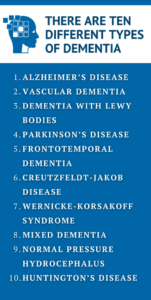An estimated 5.7 million people age 65 and older have Alzheimer’s disease. As Alzheimer’s progresses, a person’s abilities change, and it becomes necessary to put certain home safety measures in place.
What is Dementia?
Dementia is an umbrella term to describe a decline in mental ability that is severe enough to interfere with daily life. It is not a specific disease but refers to a list of different symptoms, one of those being brain and memory function.
When an individual is diagnosed with dementia, they are being diagnosed with a set of symptoms without knowing what is specifically causing them.
Dementia affects three areas of the brain: language, memory, and decision-making. As a result, individuals with dementia can experience changes in their behavior and personality.
 How Does Dementia Affect Home Safety?
How Does Dementia Affect Home Safety?
Dementia affects both the brain and the body in a variety of ways. As the disease progresses, home safety becomes a primary concern for caregivers.
How does this work? Forgetting how to use appliances like the dishwasher and the microwave. Losing the ability to follow directions.
Where am I? How long have I been here? Unable to recognize familiar landmarks. Not aware of time passing.
What is going on? Are you trying to hurt me? Delusions can begin to occur in later stages. May believe caregivers are stealing from them or that someone is following them.
Why do I keep falling down? Researchers have found that poor balance and dementia are linked and even believe that balance tests can be used to predict the likelihood of developing dementia.
This doesn’t taste good! Decreased hearing, depth perception, and inability to taste flavors they used to love.
These top ten important home safety tips will help to keep your loved one with Alzheimer’s safer:
1. Remove or lock guns, knives, and other weapons. Use a lockbox and be sure to secure the key.
2. Keep the car keys put away if your loved one is no longer able to drive.
3. Take the lock off of bathrooms and bedrooms to ensure they are unable to lock themselves in.
4. Install deadbolts on outside doors that require a key to deter roaming.
5. Check smoke and carbon monoxide detectors to be sure they are functioning.
6. Lock up all medications.
7. Have a trip and fall assessment made of the home. (Caregivers by WholeCare offers complimentary home safety assessments)
8. Install nightlights in bathrooms, hallways, and common areas.
9. Get a medical identification bracelet with your loved one’s name and contact information is essential. Be sure to have it indicate dementia or memory loss on the bracelet.
10. Talk to your neighbors, local law enforcement, and your loved one’s friends about their condition and the possibility of roaming. Make sure they have your emergency contact information.
11. Secure all storage and work areas such as garages and basements where tools, household cleaners, and other chemicals may be accessible.
Home Care Tip:
Have you or a family member recently received a dementia diagnosis, and you are unsure where to begin? Caregivers by WholeCare offers free in-home consultations as well as caregivers specially trained to work with memory care patients. Give us a call. We will help you plan your next steps. 615-422-7549.



















